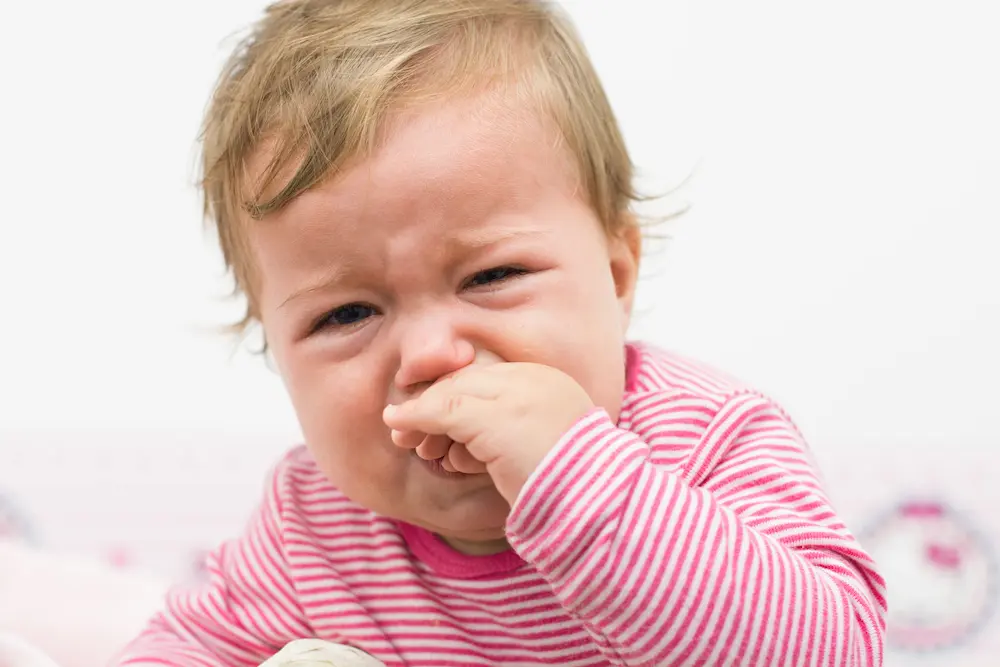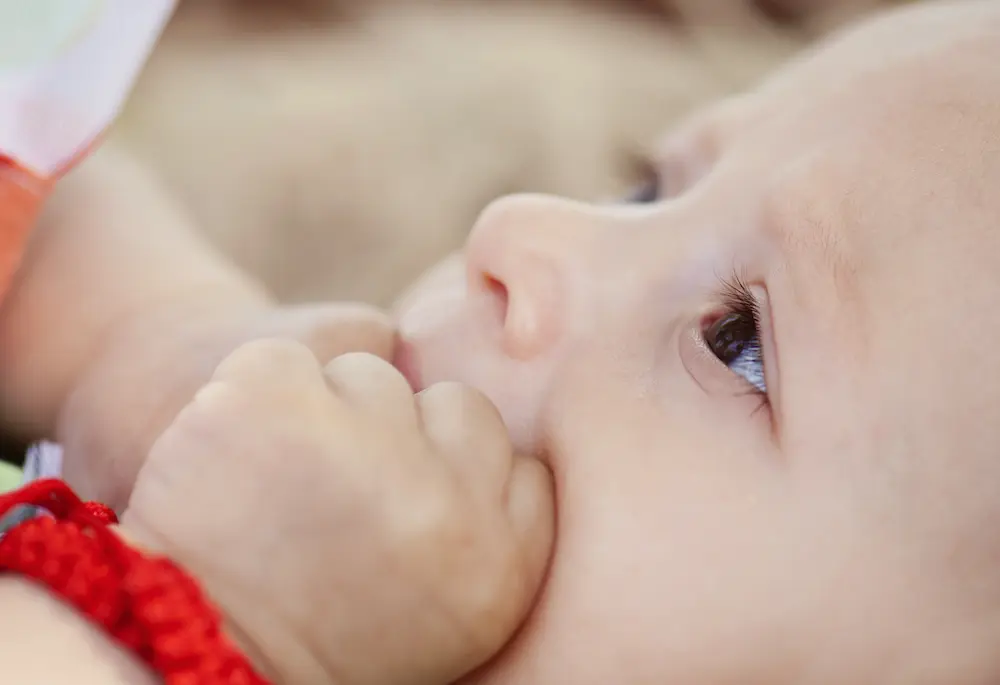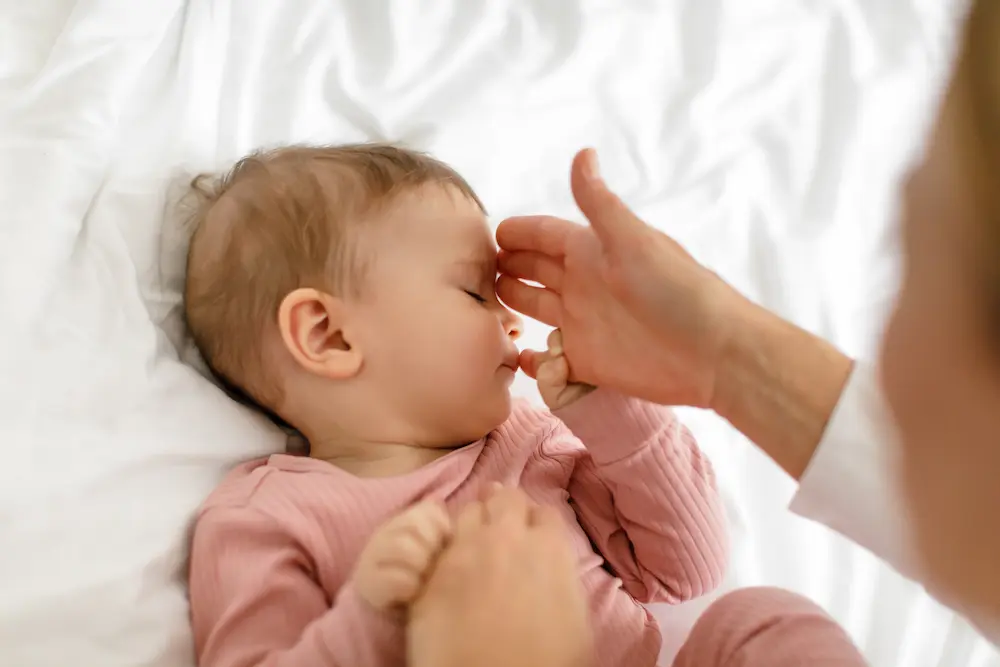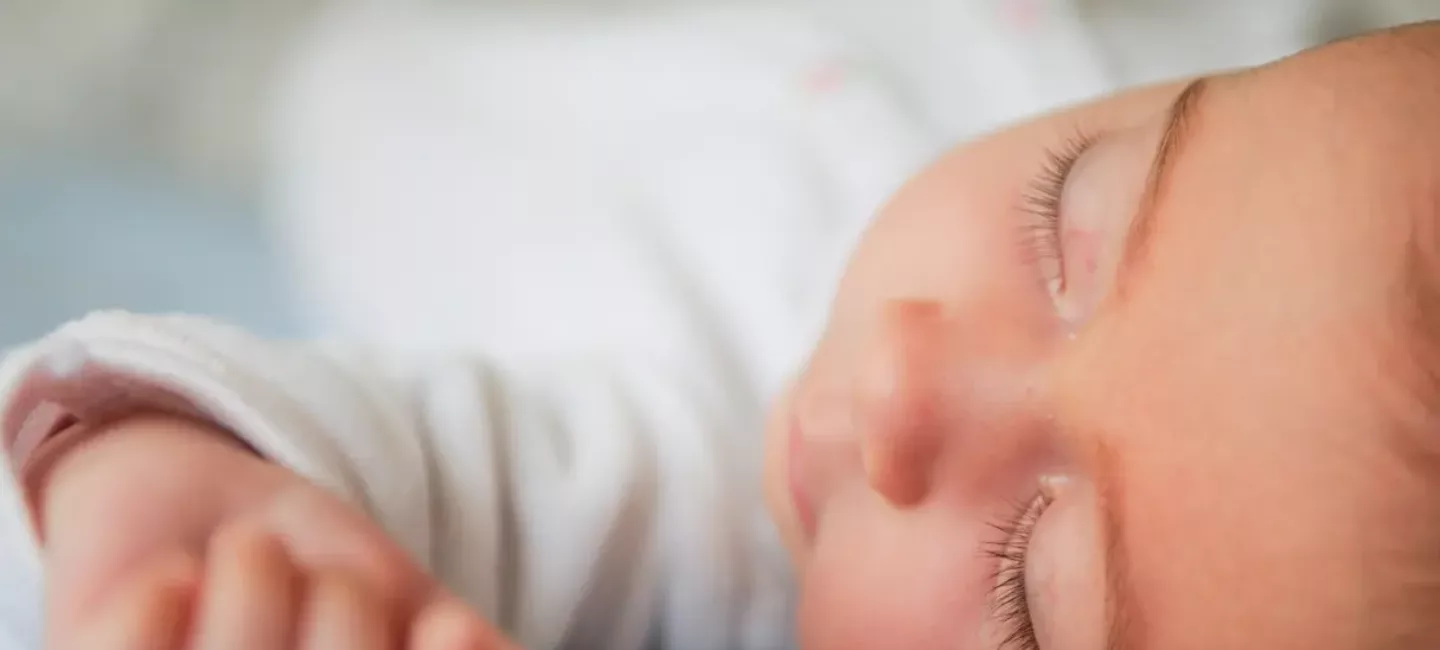
A blocked nose is one of the most common minor ailments in babies. Very bothersome for an infant who doesn’t yet know how to blow their nose, it can disturb sleep, feeding, and breathing. Why does their nose get blocked? How can you clear their airways? When should you see a doctor?
Relieving your baby’s blocked nose : here’s what you need to know.
Why is my baby’s nose blocked?
It is quite common for young children to have a blocked nose. Nasal obstruction often begins with congestion, followed by the appearance of clear, watery secretions that eventually thicken. Nasal congestion is a symptom of a harmless viral infection such as a cold (or nasopharyngitis).
As the infection progresses, the secretions may become yellowish or greenish. The color of the mucus does not indicate the severity of the infection, but it can sometimes reflect a complication of the cold, such as a bacterial superinfection. After several months, if your baby often has a blocked nose, this can also be explained by an allergy (hay fever, allergic rhinitis) or, more rarely, by an immune deficiency.
Most of the time, your baby’s immature immune system is the cause. Under the influence of certain common viruses, such as flu viruses, your baby’s nose may become irritated and produce an excess of nasal secretions to fight them, which leads to obstruction.
Other factors can weaken your baby’s airways (nose, mouth, pharynx, larynx, bronchi) and therefore contribute to nasal congestion:
- Group living: viruses circulate more easily, and nasal congestion may occur after respiratory droplets (coughing, sneezing…) or direct contact with secretions or contaminated surfaces.
- Air that is too dry or too humid.
- Gastroesophageal reflux (GER): in cases of GER, your baby is more likely to have a blocked nose. Very common in infants, it can irritate the airways and make the baby more susceptible to infections.
- A family history of allergies: it promotes rhinitis and nasal congestion, especially in the presence of pollen or other irritating airborne particles.
- Passive smoking.
- Iron deficiency.
- Chronic illness.
Want to learn more? Feel free to download the May app, where you’ll find plenty of resources to support and guide you throughout your journey as a new parent.

How do I know if my baby has a blocked nose?
It’s quite easy to recognize a blocked nose in an infant. A baby is considered to have a blocked nose when it frequently runs and the nostrils are obstructed.
Be careful, however, because nasal discharge is not always a sign of congestion. Your baby may have a blocked nose even without a runny nose. Excess mucus production should alert you to nasal congestion, as well as difficulties feeding or sleeping.

How to clear a baby’s airways?
Here are some techniques that can help you clear your baby’s nose.
Saline solution
Tissues are not suitable for infants. The best way to clean your baby’s nose is by using saline solution. If you’re unsure which one to choose, ask your doctor or pharmacist.
How do you perform nasal rinsing with saline?
Simply place your baby on their side and squeeze the saline pipette into the upper nostril so the secretions drain from the lower one. Then repeat on the other side. A nasal spray or seawater-based saline can also be used from 9 months of age to soften dried mucus stuck to the walls and promote drainage.
Whether it’s saline or spray, this care routine is usually not appreciated by babies. Although uncomfortable, it helps prevent complications and relieves congestion.
Nasal aspirator
The use of a nasal aspirator is allowed occasionally when your baby’s nose is very congested. The nasal aspirator should be used in addition to saline rinsing to suction out the mucus causing obstruction.
Medicinal nasal drops or sprays are contraindicated for infants because they may contain decongestants or antihistamines.
Nasal rinsing isn’t always easy for you or your baby. Don’t hesitate to wrap them in a swaddle and explain what you’re doing so everything goes smoothly. It can also be done with your baby sitting up once they are over 6 months old.
After a medical exam, a doctor may prescribe treatment or even antibiotics in case of bacterial superinfection. Never give any treatment without medical advice.
Be careful: some families turn to homeopathy or other natural remedies to relieve a baby’s blocked nose. Always discuss these with your pediatrician first, as not all remedies are suitable for infants.
What precautions should be taken with a baby who has a blocked nose?
If your baby has a blocked nose, rinsing is key. Don’t hesitate to clean their nose as often as needed. Healthcare professionals recommend clearing your baby’s nose before feeding so they can breathe better while drinking. Breastfeeding can absolutely continue despite nasal congestion. Feel free to offer smaller, more frequent feedings to make it more comfortable. Also remember to hydrate your baby regularly, day and night, to thin the mucus.
Nasal rinsing is also recommended before naps and bedtime to avoid breathing discomfort and help your baby feel better. In addition, slightly elevating the head of the bed (by placing books under the bed legs, for example) and airing the room twice a day can help.
If the air is too dry, you can place a bowl of water on the radiator or dry laundry in the room. Humidifiers must be used with caution and kept clean. Try to maintain a temperature around 19°C (66°F).
During this period, special attention should be given to your baby. Co-sleeping as recommended by the Ministry of Health until at least 6 months of age is especially helpful. This means having your baby sleep in the same room as you, in their own crib or bassinet.

How to soothe a baby’s cough?
Despite good airway cleaning, a blocked nose can unfortunately cause coughing or a sore throat. Coughing is a natural defense mechanism of the body. It occurs in response to airway irritation or to expel accumulated secretions. Although often tiring or uncomfortable, coughing shouldn’t always be reduced, as it helps clear mucus and protect the lungs.
A cough often accompanies a common cold, but it can also indicate a more serious infection, so it’s important to observe its nature and progression.
There are several types of cough: wet cough, which helps evacuate secretions; dry cough, caused by irritation and often harmless. However, certain types of cough should alert you:
- A “barking” cough may indicate laryngitis.
- A wheezing cough may indicate bronchiolitis or asthma.
- A coughing fit may indicate choking or inhalation of a foreign object.
- A severe coughing fit in an unvaccinated child may indicate whooping cough.
In any case, if the cough lasts several weeks, is accompanied by fever, or comes with worrying symptoms, a medical consultation is necessary.
To relieve cough, you must first facilitate expectoration (expulsion of secretions): rinse the child’s nose, keep them well hydrated, and humidify their room. Since lying down promotes drainage toward the back of the throat, it may help to slightly elevate the head of the bed. If the cough is dry, a warm drink or honey (after age 1) may soothe the throat.
Be careful: do not give cough syrups without medical advice, as they may prevent natural mucus clearance.

When should I see a doctor if my baby has a blocked nose?
It is strongly recommended to see a doctor if your baby has a blocked nose and:
- is under 3 months old,
- has a high and persistent fever,
- has a wheezing cough,
- shows signs of respiratory distress (rapid breathing, chest retractions…),
- vomits more than half of their daily feedings,
- has unusual behavior.
If your baby has any of these signs, it is essential to consult a healthcare professional promptly. Early medical care helps prevent complications and ensures your child’s well-being and safety.
A blocked nose is a common and generally benign symptom in infants. In most cases, it is a natural reaction of the body to a common viral infection such as a cold. With simple actions, you can effectively relieve your baby and help them breathe better. These daily care steps help avoid complications and improve comfort, especially during feeding and sleep.
However, vigilance remains essential. If your child has persistent fever, wheezing cough, breathing difficulties, repeated vomiting, or unusual behavior, it is crucial to see a doctor quickly. When in doubt, never hesitate to seek advice from a healthcare professional.
**
Photo credits: MaplesImages | GroundPicture | Satura_ | Prostock-studio
This text was translated from French by an artificial intelligence. The information, advice, and sources it contains comply with French standards and may therefore not apply to your situation. Make sure to complement this reading by visiting the May US/UK app and consulting the healthcare professionals who are supporting you.




